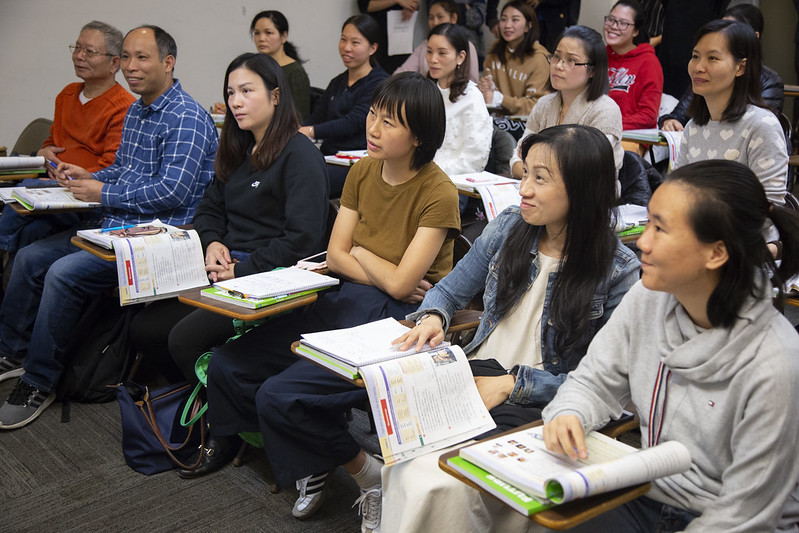
Adult literacy programming (photo: John McCarten/City Council)
People from across the world come to New York City to build a new life, bringing with them their customs, cultures, and traditions. Our newest neighbors also bring with them their own languages, contributing to the wonderful diversity of our city, but also presenting a unique set of challenges as families build their new lives.
Take my district in Flushing, which has more than 70,000 “limited English proficiency” Asian New Yorkers, roughly 70% of the total Asian population in the district. A recent report by the Asian American Federation found that two-thirds of Asian seniors need help translating English into one of 12 languages. This doesn’t only present barriers to accessing services, it isolates them in their homes and presents challenges economically, socially, and physically.
Whether you are applying for senior housing or trying to access health care, language barriers can create incredible obstacles for New Yorkers who have limited English proficiency. Before joining the City Council, I worked as an attorney with a nonprofit assisting victims of domestic violence. I saw firsthand how people’s inability to access services in their native language prevented them from getting the often life-saving help they desperately needed.
Frankly, as a city as diverse as ours, we don’t do enough to make sure that immigrants not only have access to translation services, but also to culturally-competent, full-time bilingual staff who can meet the needs of those with limited English proficiency (LEP).
Rather than hiring multilingual staff, many nonprofits and city agencies rely on a service called Language Line or some other outside translation service to assist when a language issue arises. While these outside parties can translate questions and relay answers, they can’t provide context, nor do they always possess the cultural sensitivity to handle issues that may require a deeper understanding of the nuances that exist in a community.
This often leaves LEP New Yorkers searching for someone to help interpret — a child, friend, neighbor, relative. As an immigrant, a child of immigrants, and an attorney in an immigrant community, I’ve seen how stressful it can be for immigrant kids who find themselves acting as interpreters for everything from legal cases to health issues.
Whether it’s an organization providing legal services or social services, nonprofits should be investing more resources to hire native, bilingual speakers as staff. Not only will these staff have linguistic competence, but they will have the institutional knowledge and cultural literacy to handle complex issues with sensitivity.
As I have met with nonprofits to discuss budget designations, I have been struck by the number of them who tell me that they only offer services in one or two other languages, or who believe that Language Line is a replacement for multilingual service providers.
When larger, citywide nonprofits are faced with a language issue, they often rely on smaller, community-based organizations for assistance because those groups do have the language capabilities. In my district, that includes groups like Asian-Americans for Equality, Korean Community Services of Metropolitan New York, Chinese American Planning Council, Garden of Hope, KAFSC, Charles B. Wang Health Center, SACSS, Minkwon, and more.
While larger nonprofits receive a far greater share of funding because of their more established presence in the nonprofit and government worlds, they rely on these smaller organizations to fill gaps in their own services. To provide true equity for our immigrant community, we need to increase funding for the local community-based organizations (CBOs) that are providing linguistic and cultural support to immigrant communities.
Finding, hiring, and employing qualified bilingual staff can be an expensive proposition, and it’s incumbent on city government to help support our community-based nonprofits to meet the needs of constituents. As budget negotiations continue, it’s important to recognize that a lack of multilingual services in an organization essentially means that immigrant New Yorkers have no access to that service. Increasing the amount of money flowing to CBOs in immigrant communities isn’t optional if we want to ensure access to services for all New Yorkers, and the city budget should reflect the diversity of our communities.
In order to increase access to services in a targeted and immediately effective way, New York City should create a new initiative that allocates funds to districts based on the LEP population of that district. This would allow City Council members to allocate more funds to the smaller nonprofits that are providing on-the-ground services in our districts and handling the referrals from larger organizations that lack language capabilities.
In my community and in many others across New York City, the lack of multilingual and culturally-competent services is the equivalent to not providing a service at all. Only when every New Yorker has equitable access to the services and resources they need to succeed will we have a city that truly embraces its heritage as a city of immigrants.
***
City Council Member Sandra Ung represents City Council District 20 in Queens, which includes Flushing, Murray Hill, Mitchell-Linden, Queensboro Hill and Fresh Meadows. On Twitter @CMSandraUng.
***
Have an op-ed idea or submission for Gotham Gazette? Email This email address is being protected from spambots. You need JavaScript enabled to view it.




